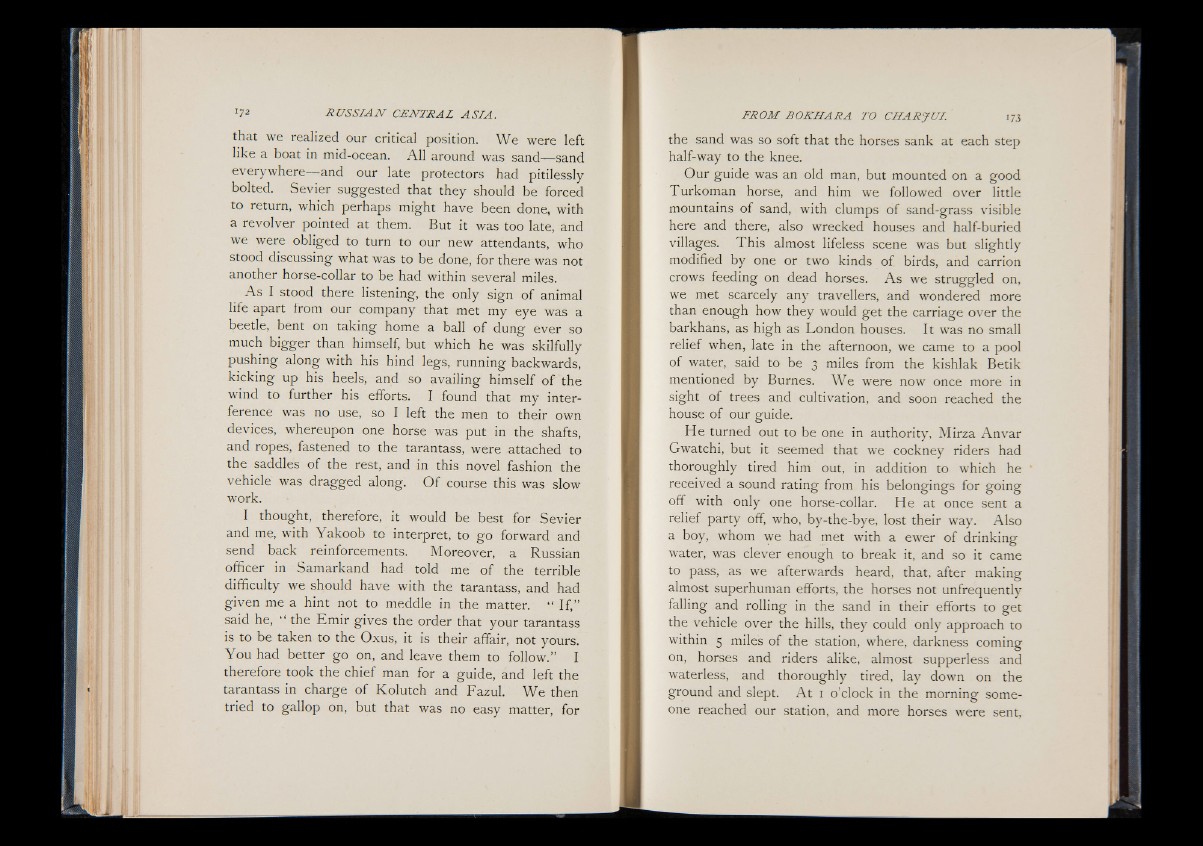
that we realized our critical position. We were left
like a boat in mid-ocean. All around was sand-—sand
everywhere— and our late protectors had pitilessly
bolted. Sevier suggested that they should be forced
to return, which perhaps might have been done, with
a revolver pointed at them. But it was too late, and
we were obliged to turn to our new attendants, who
stood discussing what was to be done, for there was not
another horse-collar to be had within several miles.
A s I stood there listening, the only sign of animal
life apart from our company that met my eye was a
beetle, bent on taking home a ball of dung ever so
much bigger than himself, but which he was skilfully
pushing along with his hind legs, running backwards,
kicking up his heels, and so availing himself of the
wind to further his efforts. I found that my interference
was no use, so I left the men to their own
devices, whereupon one horse was put in the shafts,
and ropes, fastened to the tarantass, were attached to
the saddles of the rest, and in this novel fashion the
vehicle was dragged along. O f course this was slow
work.
I thought, therefore, it would be best for Sevier
and me, with Yakoob to interpret, to go forward and
send back reinforcements. Moreover, a Russian
officer in Samarkand had told me’ o f the terrible
difficulty we should have with the tarantass, and had
given me a hint not to meddle in the matter. “ If,”
said he, “ the Emir gives the order that your tarantass
is to be taken to the Oxus, it is their affair, not yours.
You had better go on, and leave them to follow.” I
therefore took the chief man for a guide, and left the
tarantass in charge of Kolutch and Fazul. W e then
tried to gallop on, but that was no easy matter, for
the sand was so soft that the horses sank at each step
half-way to the knee.
Our guide was an old man, but mounted on a good
Turkoman horse, and him we followed over little
mountains of sand, with clumps of sand-grass visible
here and there, also wrecked houses and half-buried
villages. This almost lifeless scene was but slightly
modified by one or two kinds of birds, and carrion
crows feeding on dead horses. A s we struggled on,
we met scarcely any travellers, and wondered more
than enough how they would get the carriage over the
barkhans, as high as London houses. It was no small
relief when, late in the afternoon, we came to a pool
of water, said to be 3 miles from the kishlak Betik
mentioned by Burnes. W e were now once more in
sight of trees and cultivation, and soon reached the
house o f our guide.
He turned out to be one in authority, Mirza Anvar J ’
Gwatchi, but it seemed that we cockney riders had
thoroughly tired him out, in addition to which he
received a sound rating from his belongings for going
off with only one horse-collar. He at once sent a
relief party off, who, by-the-bye, lost their way. Also
a boy, whom we had met with a ewer of drinking
water, was clever enough to break it, and so it came
to pass, as we afterwards heard, that, after making
almost superhuman efforts, the horses not unfrequently
falling and rolling in the sand in their efforts to get
the vehicle over the hills, they could only approach to
within 5 miles of the station, where, darkness coming
on, horses and riders alike, almost supperless and
waterless, and thoroughly tired, lay down on the
ground and slept. A t 1 o’clock in the morning someone
reached our station, and more horses were sent,